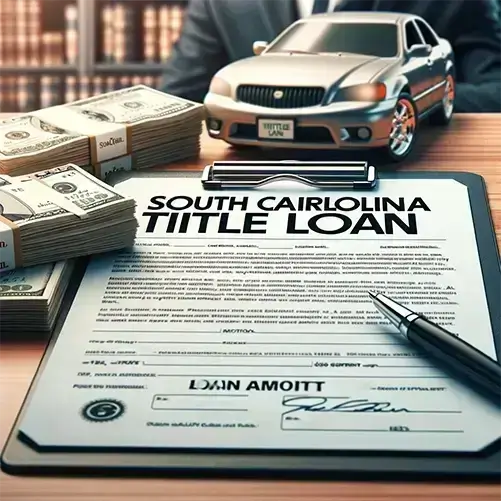
South Carolina Title Loan, learn more!
Introduction
What is a South Carolina title loan?
A South Carolina title loan is a short term loan that allows individuals to borrow money using their vehicle’s title as collateral. It is a convenient option for those who are in urgent need of funds and may not have a good credit score or access to traditional loans.
How does a South Carolina title loan work?
To obtain a South Carolina title loan, you will need to provide the lender with your vehicle’s title, which will be held as collateral until the loan is repaid. The loan amount you can receive will depend on the value of your vehicle. Typically, lenders will offer you a percentage of your vehicle’s appraised value.
Once the loan is approved, you will receive the funds and can continue to use your vehicle as usual. However, it is important to note that the lender will have a legal claim to your vehicle until the loan is fully repaid. This means that if you fail to make payments, the lender may repossess your vehicle.
Why choose a South Carolina title loan?
There are several reasons why individuals in South Carolina may choose to get a title loan:
Quick and accessible: Title loans are a fast and convenient way to get cash when you need it urgently. The application process is typically simple and can be completed quickly, often within a day.
No credit check: Unlike traditional loans, title loans do not require a credit check. This makes them a viable option for individuals with poor or no credit history.
Use your vehicle: With a title
In South Carolina, unexpected financial burdens often prompt the pursuit of swift monetary solutions.
Title loans may appear as a beacon of hope, providing quick cash using a vehicle’s title as collateral.
But it’s imperative to understand the intricacies and implications of such loans before embracing them as a financial lifeline.
If you’re grappling with financial challenges in South Carolina, know that you are not alone.
Title loans may offer an immediate financial reprieve.
However, it’s crucial to approach them with your eyes wide open, recognizing both their potential benefits and significant risks.
Title loans in South Carolina are governed by specific statutes designed to protect consumers, but they also carry inherent dangers, which is why it’s vital to make informed decisions when considering this type of financing.
Get started by filling out our online form
Understanding Title Loans in South Carolina
When the financial tide turns against you, a title loan in South Carolina might seem like a lifeline quick cash leveraging your vehicle’s title. It’s critical, though, to navigate this option with open eyes. Title loans are short term, high interest loans where your vehicle serves as collateral. In the Palmetto State, these loans are regulated but still carry steep costs. If repayment becomes challenging, the very vehicle that’s essential to your livelihood could be at risk. As you weigh the urgency of your needs against the risk, understanding the full scope of title loan terms and repercussions in South Carolina is a step you can’t afford to skip.
Title Loan Basics in South Carolina
In South Carolina, title loans offer a swift monetary solution for borrowing against your vehicle’s equity when you’re in a financial bind.
In moments of financial distress, a title loan can provide instant cash flow based on your vehicle’s value.
Yet, entering such agreements demands attentiveness to high interest rates and short repayment timeframes, with your vehicle’s title on the line.
Navigating these loans requires an understanding of the potential risk of losing your vehicle, should repayment become an insurmountable challenge.
Qualification Criteria
In South Carolina, your vehicle’s title is your ticket to accessing a loan.
To be eligible, the vehicle must be registered in your name, ensuring that you hold clear ownership without liens. This foundational requirement establishes your vehicle as a viable collateral for the loan.
A valid government issued ID, typically a driver’s license, fortifies your identification and proves that you are legally permitted to enter into such an agreement. It’s this identification which intertwines your identity with the title ownership, forming a critical link in the qualification process.
Employment status is not always a disqualifying factor, as title loans rely heavily on the equity of your vehicle rather than your income. However, proof of some consistent income may be sought to reassure lenders of your capability to repay the loan. This evidence can come from various sources, not strictly limited to traditional employment, recognizing the diverse financial situations of borrowers.
Credit history often takes a backseat to equity value in the qualification criteria for a title loan. While some lenders may glance at your credit score, your vehicle’s inherent value is the principal determinant of loan eligibility. This structure opens doors for those with less than perfect credit scores, providing a lifeline in times of stringent financial need.
Benefits and Risks
Getting a title loan in South Carolina can be a swiftly navigated path to financial relief. They offer immediate access to cash using your vehicle as collateral.
However, this convenience comes with significant risks attached. High interest rates have the potential to lead to a cycle of debt, making it challenging for some to recover. If you default on repayments, it could result in the loss of your vehicle, a critical asset for everyday life. That’s why it’s vital to plan diligently to ensure you can meet the repayment schedule.
Furthermore, title loans may have other fees apart from interest, such as origination fees or penalties for early repayment. These can add considerably to the cost of borrowing, making it imperative to read the loan agreement thoroughly before committing.
Nevertheless, for individuals in desperate need of rapid cash, title loans can be a viable option. They can help cover unexpected expenses or bridge a financial gap between paychecks, however, they should be approached with caution. It’s recommended to consider alternatives and fully understand the terms of a title loan before proceeding.
Navigating South Carolina Regulations
In South Carolina, title loans are governed by laws that set crucial parameters around borrowing and lending practices. This regulatory framework is designed to protect you, ensuring that lenders operate within certain bounds of fairness and transparency. It surrounds interest rates, terms of lending, repossession stipulations, and the like all critical factors that can have a major impact on your financial well-being. As you consider a title loan, it’s important to acquaint yourself with these specifics to safeguard against any unexpected complications. Your financial security is paramount, and being well informed is the first step in preserving it while navigating these challenging times.
State Specific Laws
In the Palmetto State, title loan regulations have unique characteristics. They are crucial for ensuring that transactions align with established legal standards, ensuring your protection.
South Carolina mandates a cap on the interest rates that can be charged by title loan lenders. This is a protective measure to keep the cost of such loans within a reasonable limit, preventing the possibility of spiraling debt from excessively high rates. Understand that compliance with these rates is not just a guideline but a legal requirement for lenders. They are in place to assist you in maintaining some level of financial stability even when you’re facing tough times.
Furthermore, the state enforces strict licensing requirements for lenders offering title loans. This means they must adhere to stringent standards and oversight, offering you added assurance that you’re dealing with legitimate businesses. It’s a safeguard aimed at minimizing your risk of falling prey to predatory lending practices that could exacerbate your financial distress.
Lastly, in South Carolina, there are specific laws in place regarding the repossession of vehicles. These regulations give you clear information on the process and timeline, should you default on a loan. These laws also outline your rights and the potential for remedies if you’re able to settle your outstanding obligations. It’s critical for you to understand these provisions to navigate the borrowing process more confidently, knowing the protections and potential consequences that accompany a title loan in your state.
Borrower Protections
Financial emergencies can strike anyone, unexpectedly.
In South Carolina, there are established borrower protections to consider. If you’re feeling overwhelmed by the urgency of your financial need, it’s essential to acknowledge these safeguards. They are designed to prevent exploitation and ensure fair treatment, giving you a sense of security and a clearer understanding of your rights when considering a title loan as a financial solution.
Repossession is not an immediate consequence.
It’s essential to know that you have options before reaching a point of no return – where repossession seems imminent. South Carolina mandates a right-to-cure period, which allows you a designated timeframe to catch up on overdue payments before a lender can legally repossess your vehicle.
Consumer rights are prominently protected.
South Carolina takes active measures to protect your interests, with laws that stipulate lenders must thoroughly disclose all terms of the loan agreement. This includes the interest rate, repayment schedule, fees, and the total cost of borrowing; these disclosures are in place so you are fully informed before committing to a title loan.
Regulations are stringent to keep lending fair.
These borrower protections are ever evolving, with legislature debates and potential policy changes aiming to continually enhance consumer financial safety. Staying informed on current laws, effective as of January 2023, ensures you are exercising your rights and entering into agreements with a clear perspective on the protections the state of South Carolina has put in place.
The South Carolina title loan Application Process Simplified
Ease your concerns, the application process is straightforward and built with your urgency in mind. First, gather the required documents, primarily your vehicle’s title, for review.
Next, you’ll complete a simple form either online or in person. This step involves submitting your information and vehicle details, including make, model, and mileage, to assess the loan’s value.
Finally, upon approval, you’ll swiftly receive the funds, providing relief for your pressing financial needs.
Required Documentation
Facing urgent financial needs can be overwhelming, but securing a title loan in South Carolina requires just a handful of key documents.
Vehicle Title: The clear, lien free title of your vehicle in your name.
Government Issued ID: A form of identification, typically a driver’s license or state ID.
Proof of Residency: Such as a recent utility bill or lease agreement in your name.
Proof of Income: Whether pay stubs or bank statements, showcasing your ability to repay the loan.
Vehicle Insurance Information: Insurance coverage is often required for the duration of the loan.
References: Personal or professional contacts that can vouch for your reliability (though not always required).
With these documents in hand, you’re on your way to unlocking the financial aid you need.
Each document serves as a puzzle piece, completing the picture lenders need to responsibly offer financial assistance.
Rest assured, the list is streamlined to combine necessity with convenience, respecting your time and circumstances.
Approval and Loan Duration
Quick turnaround times are a cornerstone of title loans in South Carolina, ensuring that your need for expedient financial support is recognized and addressed promptly.
Approval can often be secured on the same day you apply.
Once approved, the duration of your loan is typically clear cut, with terms set out in the agreement that prioritize transparency and your understanding of the repayment timeline.
In cases where your financial ground stabilizes sooner than expected, many agreements offer the option for early repayment without the burden of daunting penalties, reflecting an understanding of the fluctuating nature of personal finance.
Submit your information today!
Conclusion
Navigating through financial hardships, especially when time is of the essence, can be incredibly stressful. Yet, title loans in South Carolina offer a beacon of hope, providing swift access to the funds you urgently require.
Choose a responsible lending partner.
Compassion and understanding drive the process, ensuring that your needs are met without compromising your future financial stability.
Remember, the commitment doesn’t end with receiving the cash it extends to flexible repayment options that acknowledge the unpredictability of life’s financial demands.
For those facing immediate financial challenges, title loans can be a lifeline, enabling you to manage urgent expenses while providing a clear path to regaining fiscal health.
Remember, car title loans, auto title loans, cash loans, and fast cash loans are basically the same. Online title loans offer competitive rates.
Frequently Asked Questions
What is a South Carolina Title Loan?
A South Carolina title loan is a type of loan where you can use your vehicle’s title as collateral to borrow money quickly and easily.
How do I qualify for a South Carolina title loan?
To qualify for a South Carolina title loan, you need to own a vehicle with a clear title, have a valid ID and proof of income, and be at least 18 years old.
How much money can I borrow with a South Carolina title loan?
The amount of money you can borrow with a South Carolina title loan depends on the value of your vehicle. Typically, you can borrow up to a percentage of your vehicle’s appraised value.
How long do I have to repay the loan?
The repayment terms for a South Carolina title loan vary depending on the lender. Generally, you will have a set period of time, usually 30 days, to repay the loan in full.
What happens if I can’t repay the loan on time?
If you are unable to repay the loan on time, you may have the option to extend the loan by paying additional fees. However, it’s important to communicate with your lender to discuss your options and avoid potential consequences.
Will my credit score affect my eligibility for a South Carolina title loan?
No, your credit score does not typically affect your eligibility for a South Carolina title loan. Since the loan is secured by your vehicle’s title, lenders are more concerned with the value of your vehicle and your ability to repay the loan.
How quickly can I get the funds?
With a South Carolina title loan, you can often get the funds on the same day or within 24 hours of approval. The process is quick and convenient, allowing you to access the funds you need in a timely manner.
Can I still use my vehicle while I have a title loan?
Yes, you can still use your vehicle while you have a South Carolina title loan. The lender will hold onto the title as collateral, but you can continue to drive your vehicle as usual.
What happens if I decide to pay off the loan early?
If you decide to pay off the loan early, you may be able to save on interest charges. However, it’s important to check with your lender to understand any potential fees or penalties associated with early repayment.
Is my personal information safe and secure?
Yes, reputable lenders take the necessary measures to ensure the security and confidentiality of your personal information. It’s important to choose a trusted lender and read their privacy policy to understand how your information will be handled.
Jer is a Consultant & go-to guy for startups and founders. Expert with both Online and storefront B2C lending strategies. Jer at Trihouse Consulting is your Co-Founder, consultant, investor... Start-ups in installment, payday loan, car title lending, line of credit... Storefront to Online transition is my specialty. Focused on operations, marketing, Internet models, tribe, brick-n-mortar development, website development, regulatory & compliance, and State and Tribe licensed lending models. Banking, ODFI, ACH, ICL, Debit, Credit.
TrihouseConsulting@gmail.com 702-208-6736 (PDT)
Linked In profile
Mentioned in Digital Groth
Clarity FM
Trihouse Consulting
How to start a payday loan
zoom info
Startups.com
IWV Pro
Leaning Rock Finance
payday and paycheck loans
Automobile Pawn
Quora
Medium
RocketReach


